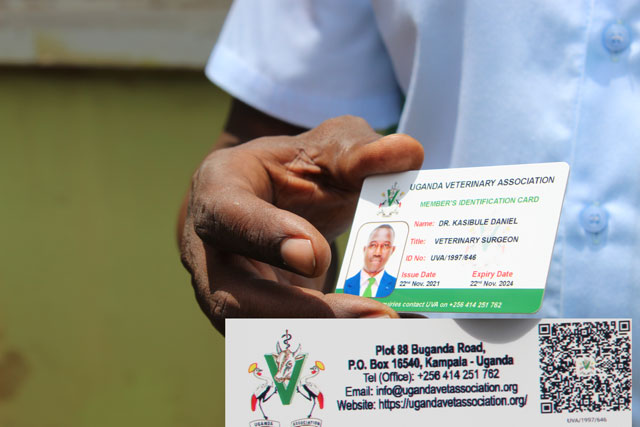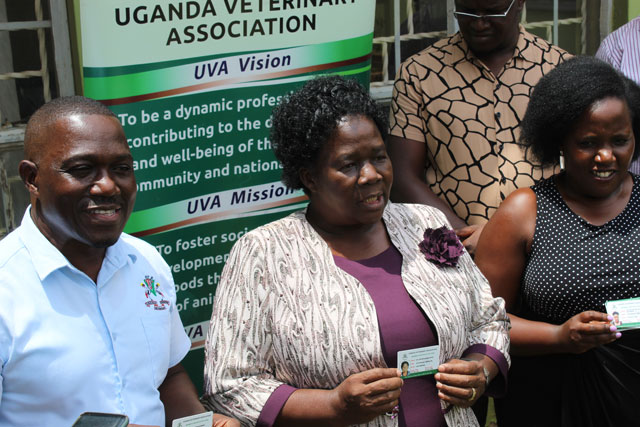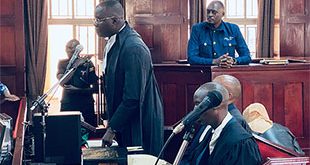
Kampala, Uganda | LOUIS JADWONG | Practicing veterinarians and para-veterinarians have been urged by the Commissioner Animal Health to acquire the newly launched UVA identification cards within a period of a year from now to ease their operations. A new Identification Card has today been launched to ensure farmers deal only with qualified personal, and help weed out fake doctors across the country.
Speaking at the launch at the Uganda Veterinary Association (UVA) offices in Wandegeya, Kampala, Commissioner Animal health Dr. Anna Rose Ademun called the issuance of IDs a good innovation that will help farmers deal only with genuine doctors.
The new card has a special QR code that after scanning, provides all the information about the qualifications of a veterinarian seeking to serve a farmer. The country’s Chief Veterinary Officer have been urged to support the effort to weed out quacks by not offering anyone not registered with the UVA animals to treat.
“Today is a big day for veterinarians,” said Ademun, Uganda’s Chief Veterinary Officer at the launch of the ID project by UVA today.
“From today, all veterinarians will be registered, so that you can be sure you are getting services from a genuine person. Within one year, ensure you acquire your Id to make your work easier,” Ademun said.
Dr Daniel Kasibule, president of the Uganda Veterinary Association hailed government for throwing their full weight behind the ID project.
He said it was timely as many farmers are going to start animal and fish farming as the Parish Development Model (PMD) is launched countrywide.

“Ugandans are going to invest their money in many projects, and to succeed, professional veterinary services and genuine animal drugs are key,” he said.
The Parish Development Model is premised on the model that the Parish Development Committee(PDC) together with common citizens as the end user of social services are better placed to identify and respond to their own needs, priorities, and direct use of resources.
Priority commodities for the Parish Model include fish, dairy, beef, coffee, cotton, cocoa, cassava, tea, vegetable Oils (Inc. Oil Palm), maize, rice, sugar cane, bananas, beans, avocado, shea nut, cashew nuts and macadamia.
Kasibule said last year’s lockdown showed that veterinary surgeons , need to emulate other professions, and have official identification documents to ensure they serve uninterrupted. Despite President Yoweri Museveni stating during the Lockdown that veterinary officers can move uninterrupted, security officials complained that many of them did not have identification indicating who they were.
CLICK RED BUTTON TO LISTEN TO AUDIO
The Uganda Veterinary Association will embark on mass publicity to sensitize farmers about the qualifications of certified veterinary doctors.
“Farmers will be confident with people with IDs when it comes to their animals since many have been complaining of their animals dying after being treated by unqualified Vets who hide in our profession,” the association president said.
“Since it’s veterinary officers to visit farmers premises, farmers always don’t know the right doctors for their animals and they end up giving wrong treatment causing to death of animals,” he said.
He asked Veterinary doctors to ensure they received their Cards with the Association within a one year period and those not registered with the Uganda Veterinary Board (UVB) to do so before getting the Association ID.
 The Independent Uganda: You get the Truth we Pay the Price
The Independent Uganda: You get the Truth we Pay the Price




There are very many personnel carrying out business of animal treatment in various villages of this country. In my regular observation , these people have caused death of many animals in the villages because they are doing something they have never practice . And there no trained personnel to supervise these people. Vet doctors are rare in most villages and the community resort to these untrained persons for treatment of their animals. In areas where trained personnel have been deployed , they are always rare in the field. Many animals die and no statistics are taken for record purposes . Qualified trained vet doctors must be deployed in every sub county and their work must be measured on the performance within the area of operation. Lastly , records for the death of animals must be kept for future use and research.